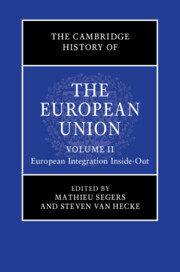Book contents
- The Cambridge History of the European Union
- The Cambridge History of the European Union
- The Cambridge History of the European Union
- Copyright page
- Contents
- Figures
- Tables
- Contributors to Volume II
- Acknowledgements
- Abbreviations
- Reflections on the History and Historiography of European Integration
- Part I Milestones: Treaties and Treaty Changes
- Part II Instruments of Integration
- Money and Society
- 7 In the Name of Social Stability: The European Payments Union
- 8 Competition versus Planning: A Battle That Shaped European Integration
- 9 Commercial Banks, the Eurodollar Market and the Beginnings of Monetary Integration
- 10 From the Werner Report to the Start of EMU
- 11 The Euro Area Crisis: From Pre-history to Aftermath
- Challenges of Expansion: Protection and Security
- Part III Narratives and Outcomes
- Index
- References
8 - Competition versus Planning: A Battle That Shaped European Integration
from Money and Society
Published online by Cambridge University Press: 12 October 2023
- The Cambridge History of the European Union
- The Cambridge History of the European Union
- The Cambridge History of the European Union
- Copyright page
- Contents
- Figures
- Tables
- Contributors to Volume II
- Acknowledgements
- Abbreviations
- Reflections on the History and Historiography of European Integration
- Part I Milestones: Treaties and Treaty Changes
- Part II Instruments of Integration
- Money and Society
- 7 In the Name of Social Stability: The European Payments Union
- 8 Competition versus Planning: A Battle That Shaped European Integration
- 9 Commercial Banks, the Eurodollar Market and the Beginnings of Monetary Integration
- 10 From the Werner Report to the Start of EMU
- 11 The Euro Area Crisis: From Pre-history to Aftermath
- Challenges of Expansion: Protection and Security
- Part III Narratives and Outcomes
- Index
- References
Summary
The European Union (EU) and its forerunner, the European Economic Community (EEC), have been economically organised around a market-oriented philosophy, which has been fed by a constant debate between two opposite poles: indicative planning and competition. This chapter will revisit the history of internal European economic policies, notably in the monetary, industrial and competition realms, by demonstrating that European institutions have usually carried on thanks to successive compromises between planning and competition and that, despite the latter’s rise since the 1990s, the contest is not yet over, especially since the advent of the Covid-19 pandemic.
More generally, the debate between planning and competition echoes the long-term controversy between the promoters of free trade and those who are willing to bend free-market rules.
- Type
- Chapter
- Information
- The Cambridge History of the European Union , pp. 234 - 260Publisher: Cambridge University PressPrint publication year: 2023



